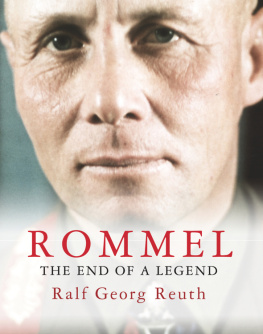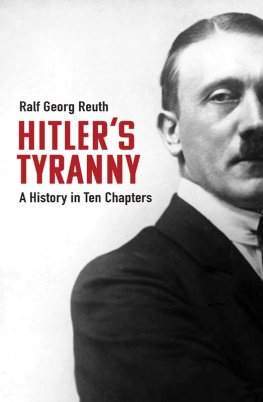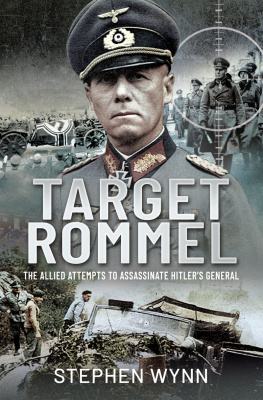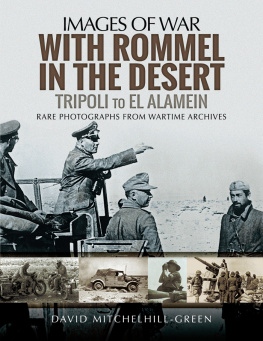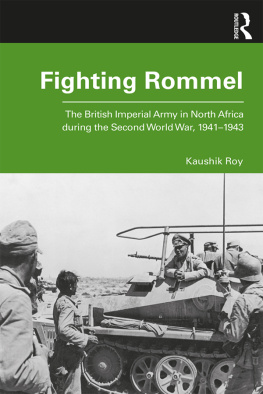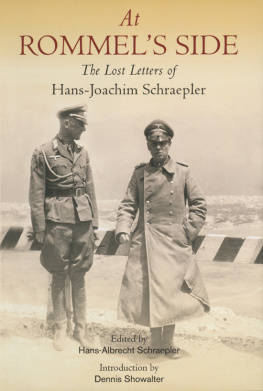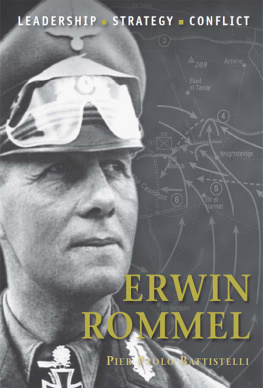Rommel
The End of a Legend
Ralf Georg Reuth
Translated by
Debra S. Marmor
and Herbert A. Danner
Originally published under the title
Rommel. Das Ende einer Legende by Ralf Georg Reuth
2004 Piper Verlag GmbH, Munchen
This English translation first published in Great Britain in 2005 by
Haus Publishing Limited
70 Cadogan Place
London SW1X 9AH
www.hauspublishing.com
English translation Debra S. Marmor and Herbert D. Danner, 2005
The moral right of the author has been asserted.
A CIP catalogue record for this book is available from the British Library
ebook ISBN 978-1-908323-53-8
Cover design by Haus Publishing
Cover images from Ullstein Bild
All rights reserved.
Introduction
Erwin Rommel is undoubtedly the German military commander of the Second World War best known in the United Kingdom, as most books about the Field Marshal were written by English historians. All these works focused on the North African campaign of 1941/42. These battles were of particular importance to Great Britain for two reasons. First, the defence of Egypt and the Suez Canal, and the whole British position in the Mediterranean with Malta and Gibraltar forming the western flank of the Empire, was strategically vital to the outcome of the Second World War. Secondly, after Dunkirk, North Africa was the only land theatre of war where the British confronted the Germans directly. Both these reasons explain the special British interest in the war in the deserts of Libya and Egypt, and thus the scale of Rommels fame.
Rommel The End of a Legend is not just another biography in the traditional sense. In this book the most important and at the same time hotly-debated questions on the topic of Rommel are treated in five chapters which build on each other to form a complete picture. In contrast to a full-length chronological biography, such a presentation enables us to clarify connections for the reader and thus draw a more sharply-defined portrait of Erwin Rommel, the man who became world famous as the commander of the Afrika Korps, both as a soldier and as a man.
In the following pages, answers are given to questions regarding Rommels relationship to National Socialism, the relative value of his North African operations to Hitlers overall strategy, his importance to wartime propaganda, and also his participation in the military resistance to Hitler. A book about Rommel would naturally be incomplete if it did not deal with the development of the myths and legends that surround him. His former British opponents played a central role in this. Even during the war Churchill paid Rommel the highest respect. British commanders like Auchinleck acknowledged him as an exceptionally capable and chivalrous soldier, after the demise of the Third Reich. Not the least reason for this was the desire to portray their own victory in North Africa in an even more positive light. This British respect, in the end, contributed to the post-war reconciliation with the former enemy.
It was Rommels enemy in North Africa who restored some measure of unsullied military honour to the Germans, in the persona of the Field Marshal a kind of rehabilitation that was accepted gratefully in view of the war of extermination in the East. The result of this was an idealisation of Rommel, which was increased following the rearming of West Germany and its entry into NATO. Rommel and the chivalrous battle between Desert Foxes and Desert Rats formed a kind of link in the new military partnership between the British and Germans. The fact that it was also Goebbelss propaganda that elevated Rommel to greatness did not fit this picture and was consequently suppressed. Instead, the Field Marshal was transformed into a belated resistance fighter against Hitler. Rommels tragic death, by poison sent to him by the Dictator in October 1944, supported this fiction.
But the point of this book, despite what its subtitle might suggest, is not to topple a military monument from its pedestal. Nor is its intent to point a moralising finger at an exceptional soldier, which Rommel undoubtedly was. That would be as disingenuous as the now common tendency to view history, particularly when it concerns the Third Reich, exclusively from the perspective of its end, thus presenting that result as the only conceivable outcome of its beginning. This perspective may support prejudices or world views, but will never do justice to historical figures.
In this book, the intent is to report soberly how it was, always guided by an awareness that historical events can only be understood in the context of their times. Rommel, too, was a child of his era, the product of his generation and constrained by the thinking and behavioural patterns of the military leadership of his time. The pressures tied up in this, which are barely conceivable from todays perspective, contributed to turning decision-making into a true personal test. And there is another factor which should not be overlooked in order to reach a fair judgement on Rommel: his own inadequacies and his contradictions; as well as his dreams and illusions, his ability to be deceived and to deceive himself.
Ralf Georg Reuth
Berlin, Autumn 2005
Hitlers General
Rommel and Hitler first met in the late summer of 1934. Rommel was in Goslar, where he commanded a Jger battalion. The Fuhrer had come to attend a Reichsbauerntag (a traditional fair for farmers and landowners that had been transformed into a political event). Side by side, the two men inspected the guard of honour in front of the Kaiserpfalz, the old Imperial palace. They were brought together by the ceremony, but they were very different in their upbringing. The one was an army officer with a strict conception of service, duty and honour. The other was his commander-in chief, an obsessive gambler, whose ostensibly revisionist politics hid the lunacy of a racially-motivated programme to conquer the world. The two might have seemed, and indeed believed, that they were quite different, but in fact their lives had many connections. On that day, they could not have guessed how fate was to bring them together.
The First World War Veterans
The battalion commander and the Reich Chancellor belonged to the same generation. They were born, in 1891 and 1889 respectively, in a Europe possessed by ultra-nationalist sentiment. Everywhere people passionately committed themselves to their national identity, searched for their common roots, and tried to define themselves as a national community. The best example of this was the Austro-Hungarian Empire, where a variety of cultures had been forced to live under one government. This feeling of national folk identity was probably why Hitler, as early as his Vienna days, had dreamed of uniting all Germans into one nation, uniting German-Austria with the German Reich. Otto von Bismarck, the Iron Chancellor, had already started the process by forming the German Reich from the previous patchwork quilt of states including Wurttemburg, Rommels home.
In addition to nationalism, the period when Hitler and Rommel were growing up also exhibited a strong desire for imperialism. The old Habsburg monarchy was experiencing internal difficulties due to its multi-cultural nature, and was content to confine itself to maintaining its continental superpower status. But Germany, on the other hand, lost no time exercising its imperial ambitions. Once the army had paved the way to the establishment of the Reich, and Kaiser Wilhelm II had succeeded to the throne, Germany commenced building a powerful navy to secure its place in the sun, alongside France and Great Britain.

